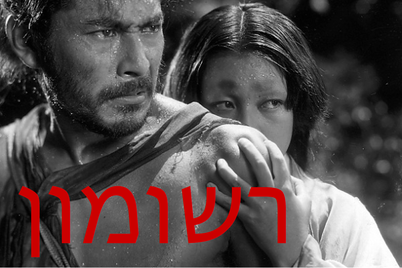
Moses then told the Israelites how all the spies had returned from the land of Israel with stories of how good and plentiful it was. Despite the spies' unanimity, the Israelites still obtusely refused to enter the land, defying the command of God. That is why, the Torah says, God punished them by forcing them to wander in the wilderness for forty years. God even punished Moses for the Israelite's refusal. The people's refusal to enter the land is the reason why Moses was forbidden to ever enter it himself (Deuteronomy 1:22-35).
You remember that story, don't you?
No? Perhaps that account seems a bit confused to you. If you are familiar with the way this same story is told in the book of Numbers, you may remember it differently. In the Torah portion Shlach Lecha, which we read just seven weeks ago, it was not the Israelites who insisted on sending the spies. It was God.
"God said to Moses, 'You will send men who will scout out the land of Canaan that I am giving to the Israelites" (Numbers 13:1). Remember?
Also, in the version of the story in Numbers, there was no unanimity among the spies. All twelve reported that the land was good, but only two of them urged the Israelites to take possession of it. The other ten declared, "We cannot go up against the people there, for they are stronger than we are" (Numbers 13:31). Deuteronomy leaves out that detail.
Also, according to Numbers, the reason the Israelites were punished with forty years of wandering was for the sin of lacking faith. God says that the Israelites failed to believe in God's power to deliver them to the land of Israel, even after they had seen the wonders performed in Egypt and in the wilderness (Numbers 14:21-22). The difference is subtle, but notably different from Deuteronomy, which says that the Israelites were punished for obstinately refusing to enter the land, not for lacking faith.
Finally, in Deuteronomy, Moses said that he was punished by God because of the people's sin of rebelling against God. Numbers is strikingly different. It says that God told Moses that he could not enter the land of Israel because of his own disobedience. At Meribah, Moses failed to follow God's instructions and called the Israelites "rebels" (Numbers 20:9-13). That is why he could not enter the land.
What is the reason for all of these differences? It could have something to do with the fact that, in Deuteronomy, Moses is the narrator and the story is clouded by his personal recollections. It could be that the authors of Deuteronomy wanted to emphasize the willful disobedience of the Israelites as the reason for their suffering.
Or, it could be that the different versions of the story just represent equally valid but differing perspectives. The two stories of the twelve spies could be a biblical Rashomon that challenges the idea of a single, objective version of the truth. The versions in both Numbers and Deuteronomy are necessary because no one version can capture the entirety of "what really happened." That is the essential theme of Akira Kurosawa's cinematic masterpiece, in which a single story can only be understood after it is presented from many perspectives.
That understanding resonates deeply with the Jewish approach to discovering truth. Judaism does not fear contradictions; it embraces them. The rabbis declared, "Any dispute that is for the sake of heaven will endure" (M. Avot 5:20). Unlike religious traditions that insist on a single authoritative answer to fundamental questions, Judaism thrives on differences of opinion.
I cannot help but think about how this understanding applies to the conflict we see in the land of Israel today. Over the past few weeks, my head has been dizzy with the different assumptions, interpretations and understandings I have read about the war between Israel and Hamas in the Gaza Strip. There are articles all over the internet that take polar opposite views of the conflict. There are many who argue that Israel is morally justified in taking limited and restrained action to stop the rockets aimed at its civilian population and to destroy the tunnels under its territory that are designed to launch terrorist attacks. You can also read articles that say that Israel is an illegal aggressor that is using its superior military might to oppress innocent people and to force them into quiescent humiliation.
Which version of the story – unfolding right before our eyes in our own time – is the truth? People on either side of the debate are utterly convinced that they are right and that their opponents are lying, self-deluded fools. The temperature of the debate only increases as each side is infuriated by the assertions of the other.
But let's make a different assumption. Let us, just for a moment, take a lesson from the two different versions of the story of the twelve spies. In that story, neither Moses nor the Israelites behaved perfectly. Depending upon which facts and perspectives they choose to emphasize, honest people draw different conclusions. That is not to say that all perspectives and all interpretations are equally valid. There is still a difference between truth and lies. But any quest to discover "the truth" will be aided by a willingness to look at things from different perspectives.
I am a strong supporter of Israel, and I believe that Israel has acted justifiably in defending itself. I believe that the rulers of Gaza have behaved immorally and cowardly by targeting civilians in Israel and by intentionally putting the lives of their own innocent civilians at risk – actually seeking the deaths of their own people to score points in the international media. Yet, I am still capable of listening to the intelligent people who disagree with me to consider the possibility that Israel has not acted as wisely as it could.
In defending itself, I believe that Israel could make better choices. Israel could put as much energy into pursuing peace as it puts into its security. Israel could act more strongly to harness the hatred and extremism that exists within its own family. Israel could do more to empathize with the suffering of those innocents who are unwillingly under Israel's control. These are thoughts that I probably would not have if my aim were to see things only from a single perspective.
Moses and the ancient Israelites entered the land of Israel with great difficulty and with many mistakes along the way. Yet, according to the Torah, they entered it in order to become a light to the nations, not only a light for their own perspective. The modern state of Israel today is similar. It doesn't do everything right. It's plight is difficult. Yet, it needs to stand for more than its own narrow self-interest. We grow and become wiser when we admit that there are many versions of the same story.
Other Posts on This Topic:
Masada Is Not What It Used to Be
Sukkot: Intentional Disorientation


 RSS Feed
RSS Feed
